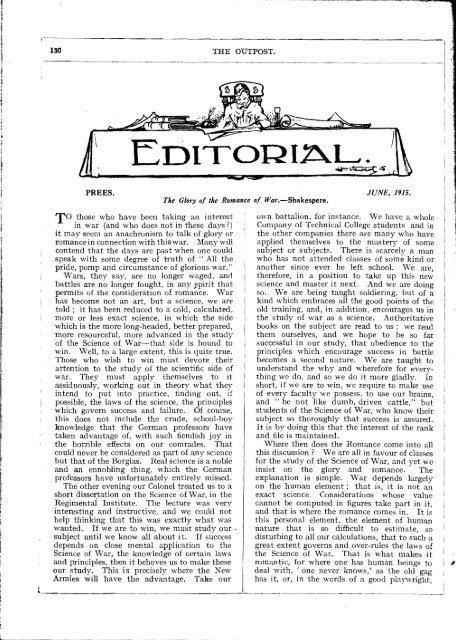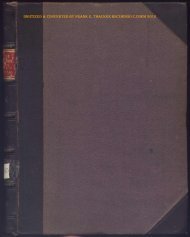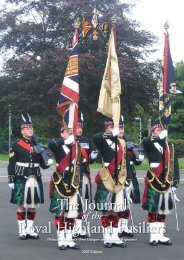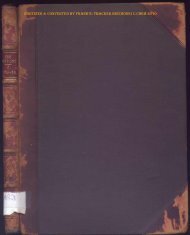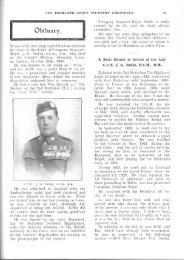The Outpost Vol 1 - The Royal Highland Fusiliers
The Outpost Vol 1 - The Royal Highland Fusiliers
The Outpost Vol 1 - The Royal Highland Fusiliers
You also want an ePaper? Increase the reach of your titles
YUMPU automatically turns print PDFs into web optimized ePapers that Google loves.
130 THE OUTPOST.<br />
,<br />
; \<br />
I EDITORI~L<br />
[<br />
.....,.~<br />
f<br />
t<br />
PREES. JUNE. 1915.<br />
<strong>The</strong> Glory of the Romance of War.-Shakespere.<br />
TO those who have been taking an interest<br />
in war (and who does not in these days?)<br />
it may seem an anachronism to talk of glory or<br />
romance in connection with this war. :\1any will<br />
contend that the days are past when one could<br />
speak with some degree of truth of " All the<br />
pride, pomp and circumstance of glorious war."<br />
Wars, they say, are no longer waged, and<br />
battles are no longer fought, in any ;;pirit that<br />
permits of the consideration of romance. vVar<br />
has become not an art, but a science, we are<br />
told; it has been reduced to a cold, calculated,<br />
more or less exact science, in which the side<br />
which is the more long-headed, better prepared,<br />
more resourceful, more advanced in the study<br />
'of the Science of \Var-that side is bound to<br />
win. Well, to a large extent, this is quite true.<br />
Those who wish to win must devote their<br />
attention to the study of the scientific side of<br />
war. <strong>The</strong>y must a'pply themselves to it<br />
assiduously, working out in theory what they<br />
intend to put into practice, finding out, if<br />
possible, the laws of the science, the principles<br />
which govern success and failure. Of course,<br />
this does not include the crude, school-boy<br />
knowledge that the German professors have<br />
taken advantage of, with such fiendish joy in<br />
the horrible effects on our comrades. That<br />
could never be considered as part of any science<br />
but that of the Borgias. Real science is a noble<br />
and an ennobling thing, which the German<br />
professors have unfortunately entirely missed.<br />
<strong>The</strong> other evening our Colonel treated us to a<br />
short dissertation on the Science of War, in the<br />
Regimental' Institute. <strong>The</strong> lecture was very<br />
interesting and instructive, and we could not<br />
help thinking that this was exactly what was<br />
wanted. If we are to win, we must studv our·<br />
subject until we know all about it. If success<br />
depends on close mental application to the<br />
Science of vVar, the knowledge of certain laws<br />
and principles, then it behoves us to make these<br />
our study. This is precisely where the New<br />
Armies will have the advantage. Take our<br />
own battalion, for instance. \Ve have a wliole<br />
Company of Technical College students and in<br />
the other companies there are many who have<br />
applied themselves to the mastery of some<br />
subject or SUbjects. <strong>The</strong>re is scarcely a man<br />
who has not attended classes of some kind or<br />
another since ever he left school. \Ve are,<br />
therefore, in a position to take up this new<br />
science and master it next. And we are doing<br />
so. vVe are being taught soldiering, but of a<br />
kind which embraces all the good points of the<br />
old training, and, in addition, encourages us in<br />
the study of war as a science. Authoritative<br />
books on the subject are read to us; we read<br />
them ourselves, and we hope to be so far<br />
successful in our study, that obedience to the<br />
principles which encourage success in battle<br />
becomes a second nature. Vile are taught to<br />
understand the why and wherefore for eVen'<br />
thing we do, and so we do it more gladly. in<br />
short, if we are to win, we require to make use<br />
of every faculty we possess, to use our brains,<br />
and "be not like dumb, driven cattle," but<br />
students of the Science of War, who know their<br />
subject so thoroughly that success is assured.<br />
It is by doing this that the interest of the rank<br />
and file is maintained.<br />
\:Vnere then does the Romance come into all<br />
this discussion ? We are all in favour of classes<br />
for the study of the Science of vVar, and yet we<br />
insist on the glory and romance. <strong>The</strong><br />
explanation is simple. War depends largely<br />
on the human element; that is, it is not an<br />
exact science. Considerations whose value<br />
cannot be computed in figures take part in it,<br />
and that is where the romance comes in. It i,<br />
this personal element, the element of human<br />
nature that is so difficult to estimate, so<br />
disturbing to all our calculations, that to such a<br />
great extent governs and over-rules the laws of<br />
the Science of War. That is what makes it<br />
romantic, for where one has human beings to<br />
deal with, 'one never knows: as the old gag<br />
has it, or, in the words of a good play'\vright,


